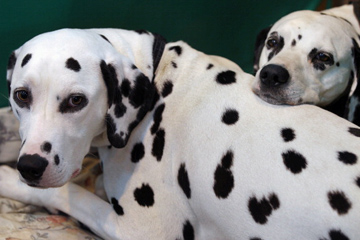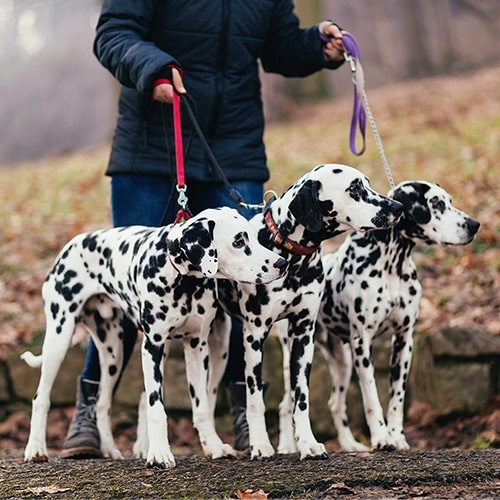Dalmatians, known for their iconic spots, have a surprising reputation when it comes to getting along with other dogs. Despite their aesthetic appeal, these lovable canines can be a bit unpredictable in their interactions with other four-legged friends. While some Dalmatians are social butterflies who thrive in multi-dog households, others may exhibit dominant or aggressive behaviors that can make cohabitation a challenge.
Dalmatians have a diverse history as working dogs, from firehouse mascots to carriage escorts. However, their background also comes with certain traits that may impact their compatibility with other dogs. With a strong prey drive and independent nature, Dalmatians may not always be the best match for every dog breed. In fact, according to some studies, Dalmatians have been found to have a higher than average incidence of dog-on-dog aggression. It is crucial for potential Dalmatian owners to carefully consider the specific needs and socialization requirements of their new furry friend before introducing them to other dogs, ensuring a harmonious and safe coexistence.

Do Dalmatians Do Well With Other Dogs?
Welcome to our comprehensive guide on the compatibility of Dalmatians with other dogs. If you’re considering bringing a Dalmatian into your family, it’s essential to understand how they interact with other canine companions. In this article, we’ll explore the social nature of Dalmatians, their compatibility with different dog breeds, and provide tips for successful dog introductions.
Dalmatians and Other Dog Breeds: What You Need to Know
Dalmatians are known for their friendly and outgoing nature, making them generally good candidates for getting along with other dogs. However, it’s important to consider factors such as temperament, socialization, and individual personalities when introducing a Dalmatian to another dog. Here are some essential things to keep in mind:
1. Temperament and Socialization
Dalmatians are typically sociable and enjoy the company of humans and other animals. However, their temperament can vary based on factors such as genetics, training, and early socialization experiences. It’s crucial to ensure that your Dalmatian has been properly socialized from a young age to increase the likelihood of positive interactions with other dogs.
When introducing your Dalmatian to another dog, it’s best to start with a controlled and supervised environment. Allow the dogs to meet in a neutral territory, such as a park or a friend’s backyard, to reduce territorial behavior. Observe their body language, and if any signs of aggression or discomfort arise, separate them and try again later.
Proper socialization and positive experiences with other dogs during puppyhood can greatly contribute to a Dalmatian’s ability to get along with other dogs throughout their lives. Early socialization exposes them to a variety of dogs, teaching them how to read and respond to different canine cues and signals.
2. Individual Personality
Each Dalmatian, like any other dog, has a unique personality. Some Dalmatians may be more outgoing and tolerant, while others might be more cautious or dominant. It’s important to consider your Dalmatian’s individual personality traits when introducing them to other dogs.
If your Dalmatian tends to be dominant or less sociable, gradual introductions and positive reinforcement can help improve their compatibility with other dogs. Using treats, praise, and rewards can create positive associations between interactions with other dogs, encouraging your Dalmatian to be more accepting and friendly.
On the other hand, if your Dalmatian is naturally friendly and gets along well with other dogs, it’s still important to supervise their interactions and ensure that their play remains safe and appropriate. Some dogs, regardless of breed, may not always match your Dalmatian’s play style or energy level, so it’s important to monitor their interactions and intervene if necessary.
Common Challenges and Tips for Introducing Dalmatians to Other Dogs
While Dalmatians generally have a good reputation for getting along with other dogs, there can still be challenges when introducing them to new furry friends. Here are some common scenarios and tips to help make the process smoother:
1. Introducing Dalmatians to Other Dalmatians
Introducing two Dalmatians can be an exciting and fun experience. However, it’s crucial to introduce them gradually and make sure each dog feels comfortable and secure. Start with short, supervised interactions and gradually increase their time together.
It’s important to note that Dalmatians, like any other breed, can display possessive behavior over resources such as toys, food, and attention. To prevent potential conflicts, it’s wise to separate them during feeding times and provide plenty of individual attention and enrichment.
If any signs of aggression or tension arise during the introduction process, consult with a professional dog trainer or behaviorist for guidance. Sometimes, having a neutral third party present can help facilitate smooth interactions between the dogs.
2. Introducing Dalmatians to Different Breeds
When introducing a Dalmatian to a dog of a different breed, it’s important to consider the size, energy level, and personality of both dogs. Introducing dogs of vastly different sizes or energy levels could lead to potential compatibility issues.
If your Dalmatian is larger or more energetic than the other dog, ensure that interactions are supervised and take place in a safe and controlled environment. This will prevent any accidental injuries or misunderstandings during their initial meetings.
It’s also helpful to introduce dogs on neutral territory to minimize territorial behavior. Allow them to interact off-leash in a securely fenced area, keeping a close eye on their body language and behavior. If they display signs of discomfort or aggression, separate them and try again later.
Tips for Successful Introductions
Introducing your Dalmatian to another dog doesn’t have to be a stressful experience. With the right approach and strategies, you can set the stage for a positive and harmonious relationship. Here are some tips for successful introductions:
1. Take it Slow
Rushing the introduction process can lead to negative experiences and potential conflicts. Take it slow and allow the dogs to become familiar with each other gradually. Patience is key when it comes to successful introductions.
2. Use Positive Reinforcement
Positive reinforcement is a powerful tool for shaping behavior and creating positive associations. Reward your Dalmatian and the other dog for calm and appropriate behavior during their interactions. This will help them associate each other’s presence with positive experiences.
3. Supervise Interactions
Always supervise your Dalmatian’s interactions with other dogs, especially during their initial meetings. This allows you to intervene if necessary and ensures the safety and well-being of both dogs.
4. Seek Professional Help if Needed
If you encounter any persistent issues or feel overwhelmed during the introduction process, don’t hesitate to seek help from a professional dog trainer or behaviorist. They can provide guidance tailored to your specific situation and help ensure a successful integration.
Remember, every dog is unique, and compatibility can vary between individuals. While Dalmatians generally have a good reputation for getting along with other dogs, it’s essential to consider each dog’s personality, socialization, and proper introductions to ensure a positive and harmonious relationship. With patience, understanding, and the right approach, your Dalmatian can thrive in the company of furry friends.
Key Takeaways: Do Dalmatians Do Well with Other Dogs?
- Dalmatians are generally friendly and sociable dogs.
- Early socialization is crucial to ensuring good interactions with other dogs.
- Proper introductions and supervised interactions can help prevent any potential conflicts.
- Dalmatians may have a dominant nature, so ongoing training and clear leadership are essential.
- Every dog is unique, so individual temperament and personality should always be considered.
Frequently Asked Questions
Dalmatians are known for their unique spots and lively personalities. If you’re considering adding a Dalmatian to your family, you might be wondering how they get along with other dogs. Here are some frequently asked questions about Dalmatians and their interactions with other canines.
1. Are Dalmatians generally friendly towards other dogs?
Yes, Dalmatians can be friendly and sociable with other dogs. However, like with any breed, individual personalities can vary. Proper socialization and positive experiences during their formative years are crucial to ensure a friendly and well-adjusted Dalmatian. Early and ongoing socialization can help them become more comfortable and confident around other dogs.
It’s important to note that Dalmatians have a strong prey drive. This means that their instinctual behavior might lead them to chase small animals or other pets. With proper training and early socialization, however, Dalmatians can coexist peacefully with other dogs, as well as other animals, in the household.
2. Can Dalmatians be territorial towards other dogs?
Like any breed, Dalmatians can exhibit territorial behavior if they feel their space or family is threatened. This behavior can be minimized with proper training and socialization from an early age. It’s important to establish clear boundaries and rules for your Dalmatian, as consistency and structure can help prevent territorial issues.
If introducing a Dalmatian to another dog, it’s best to do so gradually and in a controlled environment. Supervision is key, especially during the initial phases of their interaction. With patience, positive reinforcement, and consistent training, most Dalmatians can coexist peacefully with other dogs and show appropriate boundaries and manners.
3. Are Dalmatians compatible with small or large dog breeds?
In general, Dalmatians can be compatible with both small and large dog breeds. It’s important to consider the individual temperaments and personalities of the dogs involved when assessing compatibility. Some Dalmatians may have more playful and energetic personalities and may do well with equally lively breeds, while others may prefer calmer companions.
Proper introductions and supervision when initially bringing different-sized dogs together can help ensure a harmonious relationship. Size differences should be taken into account to prevent accidental injuries during play or interactions. Observing the behavior and body language of the dogs is essential in determining their compatibility and making informed decisions regarding their interactions.
4. How can I help my Dalmatian get along better with other dogs?
There are several ways to promote positive interactions between your Dalmatian and other dogs. Firstly, early socialization is crucial. This involves exposing your Dalmatian to various situations, people, and other dogs from a young age. Positive experiences during these interactions can help your Dalmatian become more comfortable and confident around other canines.
Training is also essential. Teaching your Dalmatian basic obedience commands, such as “sit,” “stay,” and “leave it,” can give you better control in different situations. Additionally, using positive reinforcement, such as treats or praise, when your Dalmatian behaves well around other dogs can reinforce good behavior and create positive associations.
5. Are there any breeds that Dalmatians might not get along with?
While every dog is an individual, there are no specific breeds that Dalmatians inherently do not get along with. Compatibility depends more on the individual personalities and temperaments of the dogs involved rather than their specific breeds. It’s important to introduce any new dog to your Dalmatian gradually and in a controlled environment.
If you’re unsure about how your Dalmatian will interact with a particular breed, it’s helpful to consult with a professional dog trainer or behaviorist who can assess their compatibility. They can provide guidance and help you create a plan to introduce the dogs safely and facilitate a positive relationship.

The truth about Dalmatians | Beautiful dog breed
Summary
If you’re wondering whether Dalmatians get along with other dogs, here are the key points to remember:
Firstly, Dalmatians can be friendly and sociable, but they may not always get along with every dog they meet. It’s important to introduce them properly and monitor their interactions.
Secondly, early socialization is crucial for Dalmatians to learn how to interact with other dogs. Positive experiences and training can help them become more comfortable and friendly.
Ultimately, every dog is unique, and their temperament can vary. Some Dalmatians may get along great with other dogs, while others may prefer their own company. It’s essential to know your individual dog and provide appropriate socialization and supervision to ensure a harmonious relationship with other dogs.
